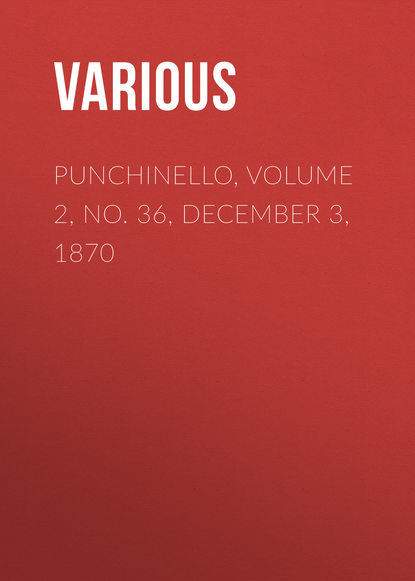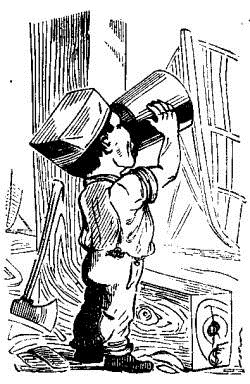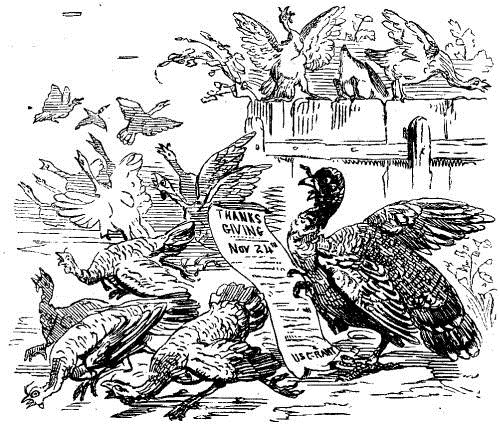 Полная версия
Полная версияPunchinello, Volume 2, No. 36, December 3, 1870
P.S.—It is scarcely necessary in my present exhausted state to say that my liberation is once more entirely due to the intercession of that man of all men, the defender of injured innocence, and the champion of all unfortunates, the most honorable Mr. WASHBURNE, American Minister, &c. He told them that he had known me from boyhood; that my father died in the lunatic asylum, and dying, bequeathed his intellectual characteristics to his son, which was all he had to bequeath. The King said it was more than likely, and so I got off.
DICK TINTO.
Wonderful Sagacity
Newspapers mention that an Irish crow has lately arrived as a passenger on board the steamship Colorado. It is stated that the bird has positively declined to quit the ship, and the inference is that its unwillingness to do so arises from fear lest it might be mistaken for a Thanksgiving Turkey.
A Wintry Reflection
The only Weather Profits that never fail are the gains of the coal dealers.
Nautical
When does a ship display a propensity for climbing?
When she runs up her flag.
THE PLAYS AND SHOWS

Latest of Mr. BOUCICAULT'S mixtures is another Irish dramatic stew. He calls it the Rapparee, and it contains the usual proportion of fire, patriots, whiskey, traitors, pretty girls, and red-coat officers. It has a Tragic Heroine and a Cheerful Heroine, a French Officer who speaks with an Irish brogue, and a Dutch General who speaks the Fechterian dialect. It has FRANK MAYO in picturesque attitudes on the stage, and HARRY PALMER in gorgeous vestments in the lobby. But here it is—as long as the original and nearly as tedious. Read it and decide for yourselves whether this sort of thing is worthy of the clever mechanic who constructed Arrah-na-Pogue?
THE RAPPAREE. ACT ISCENE I.—A retired spot in the public highway. [Enter an army of fifteenIrish patriots, armed with pikes of great scythes.]1st PATRIOT.—"Hurroo for KING JAMES, we'll dhrive the Orange-men into the say. Here comes O'MALLEY, and the FRINCH OFFICIR. May they niver want a bottle, or a frind to stale it from." [Enter O'Malley and Duquesne,]
O'MALLEY.—"All is lost. ULICK has betrayed us."
DUQUESNE.—"All is lost. ULICK has followed the national custom."
PATRIOTS.—"All is lost. Hurroo. What'll we do now, boys?"
O'MALLEY.—"Come with me to France. We'll fight somebody there."
PATRIOTS.—"We will go this minute." [They go. Enter Tragic Heroine.]
O'MALLEY.—"Can I belave the eyes of me. Is it you, darlint, or some other ghost?"
TRAGIC HEROINE.—"'Tis I. Fly, O'MALLEY. ULICK insists upon marrying me, and hanging you."
O'MALLEY.—"I will fly to-morrow night, and you shall fly with me. I would go this minute, were it not that Mr. BOUCICAULT'S play would be spoiled if I did not stay long enough to get into difficulties. I will hide in the cellar of my ruined castle, and will give ULICK the worst 'hiding' he ever had if I have a convenient chance at him."
SCENE II—The front parlor in O'Hara's castle. Enter the Dutch General and O'HaraDUTCH GENERAL.—"O'HARA, I dinks you pe ein repel. ULICK is searging your bapers. If he finds something you shall be hanged." [Enter Ulick.]
ULICK.—"I have searched O'HARA's trunk, and the drawer where he keeps his other stocking. I have found nothing."
DUTCH GENERAL.—"I still pelieve him a traitor, but I gannot brove it." [Exit.]
ULICK.—"O'HARA, listen. I have lied. I hold here in my left coat-tail pocket the proofs of your treachery. Give me your daughter and help me hang O'MALLEY, or I will ruin you."
O'HARA.—"I am in your power. Do as you please." [Enter Tragic Heroine.]
TRAGIC HEROINE.—"Never. ULICK shall neither marry me nor hang O'MALLEY."
ULICK.—"Young woman, I will lock you in this room for a year or two, until O'MALLEY is thoroughly hung. Come, O'HARA." [Exeunt.]
TRAGIC HEROINE.—"I must escape and warn O'MALLEY. But how? I have it. I can leap out of the window into the sea: I can then swim in full ball-dress to O'MALLEY'S castle, which is only twenty leagues from here. I will warn him, and fly with him. Courage. I will remove my back-hair and make the hazardous leap." [She leaps.]
SCENE III.—The vaults below O'Malley's castle. Enter Dutch General,O'Hara, Ulick, and the "Doctor," a rebel prisonerDOCTOR.—"I brought you here to show you O'MALLEY'S hiding-place. Now I've got you. The tide rose the moment we entered, and cut off your retreat; we'll all be drowned like rats in a hole. Hurroo." [O'Malley descends into the vaults by an iron door.]
O'MALLEY.—"Come up-stairs out of the wet. We'll have some whiskey." [They come up.]
ACT IISCENE I.—O'Malley's ancestral back-garret. Enter Tragic Heroine in ball-dress, having swum across the bayTRAGIC HEROINE.—"Ha! also Ho! I am a little out of breath. I think I had better faint." (Faints.) [Enter O'Malley and his rescued enemies.]
O'MALLEY.—"Sit down, while I go for the whiskey." [He goes.]
O'HARA.—"What do I see? My daughter! Take her up-stairs before O'MALLEY returns." (They take her up.) [Re-enter O'Malley.]
O'MALLEY.—"Gentlemen, here is the whiskey. It is Gen. GRANT'S favorite brand, and you'll find it all right." [To his servant] "CONNER, these men mean to arrest me. Go and set fire to the castle." [Connor goes, and O'Malley, locking the door, throws the key out of the window.]
EVERYBODY.—"What do you mean by throwing away the key? Do you mean to surround us, and, making us prisoners, drink up the whiskey yourself?"
O'MALLEY,—"'Tis a custom of our house, intended originally to give employment to meritorious locksmiths on the eve of election. Listen while I tell you how one of my ancestors played a nice little trick on some officers who had come to arrest him for shooting his landlord. He locked them up as I have locked you up. He then ordered his servant to set the castle on fire as I have just done, and was baked with them as we are about to be baked."
DUTCH GENERAL.—"Donner und blitzen!"
EVERYBODY ELSE.—"Tare an ounds!"
TRAGIC HEROINE, [in the loft above].—"S c r r r e e e c h."
O'MALLEY.—"Heavings! That shriek. 'Tis my Grace! TRAGIC DARLING, I come to die with you." [Rushes up the chimney, while the Dutch General, blowing off the lock off the door with his pistol, escapes together with his friends. The Castle is carefully taken to pieces in sections by the stage carpenters, while torches are flashed at intervals. Finally a Roman candle is set off, and the O'Malley Castle falls a prey to a carefully managed conflagration.—Curtain.]
ACT IIISCENE I.—A quiet place in midst of the turnpike. Enter Cheerful Heroine and French OfficerFRENCH OFFICER.—"Fly with me at once."
CHEERFUL HEROINE.—"Why on earth should I fly? I have never seen you but once."
FRENCH OFFICER.—"'Tis true; but you'll have to settle that with BOUCICAULT. I'm sure I don't want you to fly, especially with no property but a low-necked dress and short sleeves; but BOUCICAULT has arranged it to suit himself."
CHEERFUL HEROINE—"In that case I will fly." [Enter the DOCTOR and a band of patriots.]
DOCTOR.—"O'MALLEY is a prisoner in the fort. We are going to have him out, dead or alive."
FRENCH OFFICER.—"These are the counsels of madness. Why don't you get an injunction, or something of that kind, and so get him out peaceably."
DOCTOR.—"It's too late. Besides, Mr. BOUCICAULT wants to end the play with a fight."
CHEERFUL HEROINE.—"I will manage it all. I will let down a rope from the fort. You shall all be drawn up and rescue O'MALLEY. Nothing could be more simple. Come and be drawn up." [They come.]
SCENE. II.—Interior of the O'Malley's cell. Enter Tragic HeroineTRAGIC HEROINE.—"'Tis he!'tis he! Though how he managed to change his clothes and put on such a nice coat, I can't imagine. Dearest, awake!"
O'MALLEY.—"Who calls? Is it the boy with the beer? Ha! my own darling. Come to this embroidered waistcoat."
TRAGIC HEROINE.—"I have agreed to marry ULICK on condition he permits you to escape."
O'MALLEY.—"Ha! base girl. Would ye onconvenience yourself to save me? Never! I will not consent to your marrying ULICK. Try some other little game, darlint"
TRAGIC HEROINE.—"I will." [Exit.]
SCENE III.—The castle moat. O'Malley in the ditch standing in a picturesque attitudeThe Dutch General stands on the summit of a wall three feet high, and leaning overthe battlements—which tower to the height of three inches—handsO'Malley a pardon. Enter Tragic Heroine and everybody elseTRAGIC HEROINE.—"O'MALLEY. I have saved you. Now save me. I have just married ULICK. Kill him for me."
ULICK and O'MALLEY accordingly slash each other across the legs with their rapiers. O'MALLEY kills ULICK and embraces the TRAGIC HEROINE. Everybody shouts "Hurroo!" and the curtain falls.
MATADOR.

EFFECT OF THE PRESIDENT'S PROCLAMATION UPON CERTAIN PARTIES INTERESTED.
SARSFIELD YOUNG'S PANORAMA
PART IITHE ALPSThese mountains, which are permanently located in Switzerland, and favorably mentioned in all the geographies, are justly admired by tourists for their grandeur, natural beauty, and good hotel accommodations.
This is a view at sunrise, by one of the early painters. Everything is up, but Mont Blanc is up more than his neighbors. The whole landscape is bathed in the golden glories of the orb of day. A bath in the morning is invigorating indeed.
These Peaks are clustered around in silent majesty. It looks as though the entire PEAK family had come here and settled. These snow-capped summits, wild ravines, mountain torrents, and the series of crags which WILLIAM TELL was in the habit of addressing, are truly soul-inspiring.
Here is a guide with his party. These guides are well-trained men, who never bolt, but always go with their party—the ultramontane. They are of high birth, and descended from the best Alpen Stock.
No one should pass the season in Switzerland without seeing these mountains. They will repay a perusal.
While the prices may not be extravagant enough for Americans, still, those who have scaled these noble elevations may well account the prospect as one of the most striking features of a foreign climb.
A SCENE IN THE TROPICSThis gorgeous painting brings before you all the luxuriance of tropical vegetation. Magnolias and palm trees wave their heads proudly, while bananas, oranges, and bread fruit abound in rank profusion. Here the cane brake stretches away as far as the eye can reach (and to those who are not near-sighted still farther), recalling those beautiful lines of the poet:—"Break, break, break!"
The broad river in the foreground, mountains melting away on the horizon (that's because they're volcanic), and the sun broiling and sizzling high up in the heavens, are deliciously blended together. Our artist, full of perspiration (he can blend better than any man we ever ployed), has seized upon a moment when all Nature seems to say: ("Steady there, what makes that canvas wriggle so?")
Notice the warmth of coloring; and see to what a high degree of art the general effect is carried-about 90° Fahrenheit in the shade. This picturesque object is an alligator basking in the sun. Our advice to inexperienced travellers is: "Let him bask!"
These cotton fields, rice plantations, and the colored member of Congress addressing his constituents on the right, all stamp this scene as unmistakably Southern.
We will cancel the stamp and move on.
In our next we shall find that our artist has given himself more latitude, say about eighty degrees North.
WINTER IN SPITSBERGENBehold these regions of eternal ice and snow—miles upon miles of frozen real estate. There is a great ice monopoly here. All, all is blank; except the ship over in this corner. She is a prize. This is the place to buy thermometers; you'll generally find them going very low. The weather in this region is mostly day and night, but rather irregularly divided between the two.
You see these people with rough beards and red shirts, looking like New York firemen? You take one to be MOSE? You are right—they are Esquimaux. They are a tough, and hardy race. Though not precisely students, they yet consume the midnight oil—chiefly as a beverage.
This great work is the combined production of thirteen artists; twelve of them, perishing in the attempt, were handsomely buried at our expense; and the survivor is now keeping a bar, for his own consumption, at St. Paul, Minnesota. He was compelled to lay aside the brush, which accounts for the water in this corner not being frozen, as the contract stipulated. But this allows the ship to which I referred to float comfortably.
These small buildings are settlements. They are not so frequent here as in New York or Chicago, where business men inform me they occur about as often as—once in two years.
"Ice cream for sale," on this sign, has a flavor of civilization in it.
Woman does not go to the poles here, although one of them is only a few miles distant in a northerly direction, with excellent sleighing.
I would make a passing allusion to this figure, introduced by artist number nine, to please the young people. It represents a Spitsbergen lover. He is clad in fur, and has a catarrh. He is just now oh his sneeze, warbling hoarsely: "Rein deer in this bosom!"
(Sentimental strains from the melodeon.)
THE GRAND CANALThis is not the Erie Canal, but the Grand Canal of Venice. It does not own so many mules, or forward so much corn and flour, as the New York concern, but is more airy and picturesque. It is surrounded by palaces; but what is a palace without a mother?
These swan-like men-of-war are gondolas. Our skipper is called a gondolier. Every other skipper is called something worse than that if he gets in our skipper's way. I respect a man's calling; that is, if he follows it up energetically.
The Rialto, with its busy throngs.
The Bridge of Sighs, where Lord Byron is said to have stood on either hand.
A group of native beggars. This man is blind. With this Venetian blind we beg leave to close this scene.
SARSFIELD YOUNG.
The Flesh-pots or Paris
A late newspaper item states as follows:—
"The Archbishop of Paris has given permission to use horse-flesh on fast days."
It is lucky for Mr. BONNER'S crack horses, then, that they are not stabled in Paris just now, since they are all considered first-rate for Fast days.
"SOAP"-STONES.—Wall street "rocks."



